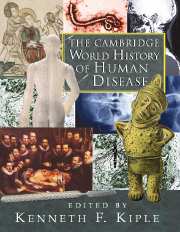Book contents
- Frontmatter
- Introduction
- Part I Medicine and Disease: An Overview
- Part II Changing Concepts of Health and Disease
- Part III Medical Specialties and Disease Prevention
- III.1 Genetic Disease
- III.2 Immunology
- III.3 Nutritional Chemistry
- III.4 Diseases of Infancy and Early Childhood
- III.5 Famine and Disease
- III.6 A History of Chiropractic
- III.7 Concepts of Addiction: The U.S. Experience
- III.8 Tobaccosis
- III.9 Occupational Diseases
- III.10 History of Public Health and Sanitation in the West before 1700
- III.11 History of Public Health and Sanitation in the West since 1700
- Part IV Measuring Health
- Part V The History of Human Disease in the World Outside Asia
- Part VI The History of Human Disease in Asia
- Part VII The Geography of Human Disease
- Part VIII Major Human Diseases Past and Present
- Indexes
- References
III.7 - Concepts of Addiction: The U.S. Experience
from Part III - Medical Specialties and Disease Prevention
Published online by Cambridge University Press: 28 March 2008
- Frontmatter
- Introduction
- Part I Medicine and Disease: An Overview
- Part II Changing Concepts of Health and Disease
- Part III Medical Specialties and Disease Prevention
- III.1 Genetic Disease
- III.2 Immunology
- III.3 Nutritional Chemistry
- III.4 Diseases of Infancy and Early Childhood
- III.5 Famine and Disease
- III.6 A History of Chiropractic
- III.7 Concepts of Addiction: The U.S. Experience
- III.8 Tobaccosis
- III.9 Occupational Diseases
- III.10 History of Public Health and Sanitation in the West before 1700
- III.11 History of Public Health and Sanitation in the West since 1700
- Part IV Measuring Health
- Part V The History of Human Disease in the World Outside Asia
- Part VI The History of Human Disease in Asia
- Part VII The Geography of Human Disease
- Part VIII Major Human Diseases Past and Present
- Indexes
- References
Summary
Addiction has remained a vague concept in spite of efforts to define it with physiological and psychological precision. The word’s Latin root refers to a legal judgment whereby a person is given over to the control of another. In recent centuries the meaning has ranged from a simple inclination toward an activity or interest to an uncontrollable desire to take opium, which historically was viewed as the most addictive of drugs. Opiate addiction is characterized chiefly by the repeated use of the drug to prevent withdrawal symptoms, which include muscle and joint pains, sweating, and nausea. The extreme discomfort of withdrawal passes away after one to three days, although a yearning for the drug may last for a very long time. Some attempts to define addiction in medical terms (e.g., restricting it to opiate withdrawal phenomena) have led to confusion among members of the public because cocaine, according to that restricted definition, would be considered nonaddictive and, by implication, safer than the Opiates.
For the sake of brevity, this essay considers chiefly opium and coca and their constituents and derivatives. The chemicals that could be discussed range from the barbiturates to lysergic acid diethylamide (LSD), but the models of control and therapy commonly applied to these other substances evolved in the past two centuries from experience with the coca bush, opium poppies, and their powerful alkaloids.
- Type
- Chapter
- Information
- The Cambridge World History of Human Disease , pp. 170 - 176Publisher: Cambridge University PressPrint publication year: 1993



